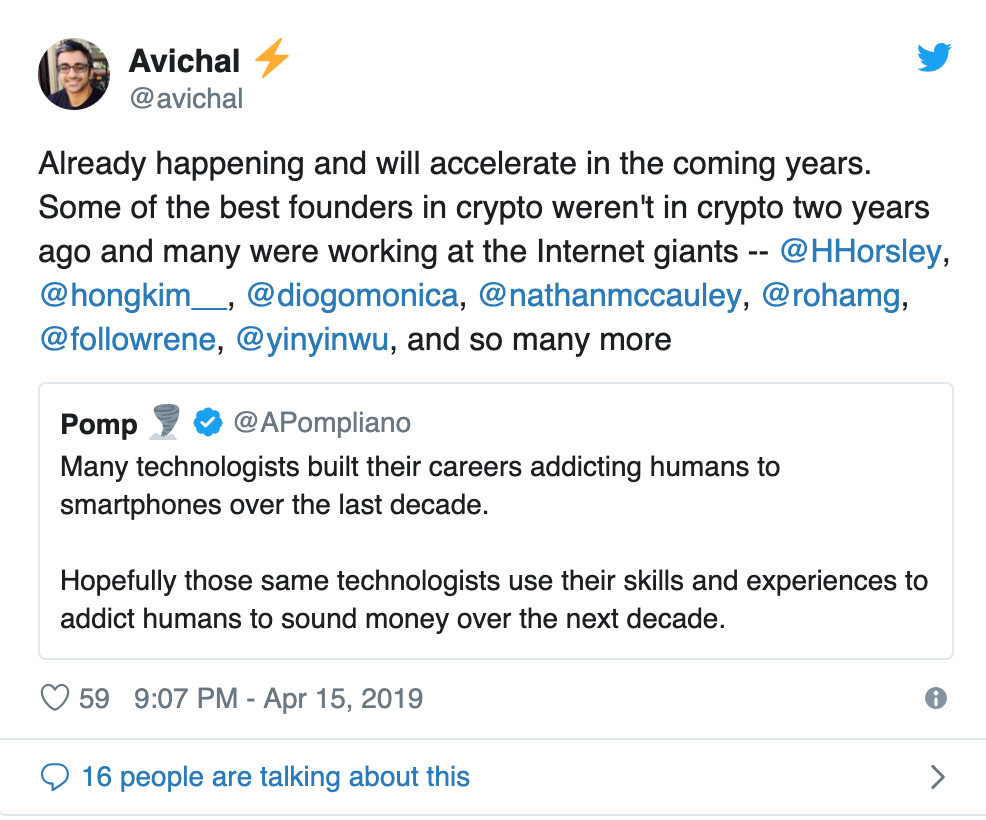Op-Ed: Why the Crypto Community Empowers Entrepreneurs and Not Investors

Investing in crypto tokens challenges traditional western investing practices, as we are and will be in a retail-dominated market for the foreseeable future. Building in crypto, on the other hand, unlocks magnitudes of more opportunities for an entrepreneur. Read the rest of the post to understand why.
Being an entrepreneur is hard. In the last few days, I’ve been waking up in bed, and felt a constant urge to ask myself:
What am I doing?
Am I really doing something useful with my life?
Why does entrepreneurship feel like a grind, just like a regular job? I thought I left that for a reason. ?
But after spending some time meditating (which is the best life hack I uncovered in the last 2 years) and with a nice cup of coffee with
Truthfully, being an entrepreneur in the crypto and blockchain space is a true blessing.
And here are the top reasons why:
- Entrepreneurs get free access to a diverse community to test their hypothesis or minimum-viable-product (MVP) that no traditional tech entrepreneurs had the luxury of accessing
The crypto community that we are part of (on Twitter, Reddit, wechat or others), is one of the most exciting real-life testnets for upcoming technology innovations.
Remember, every year we see new groups of diverse people entering this space. Many new entrants into crypto come from traditional jobs and roles, from all over the world. More importantly, many of these folks have also gone ALL-IN in crypto, whether it’s with their time, professional job, or capital. So they are invested in enlarging and improving the ecosystem.
As a result, with the inherent digital, and distributed nature of the crypto community, and high knowledge-barrier to entry, you can receive feedback on your hypothesis or MVP extremely quickly from smarter-than-average folks from around the world.
And I don’t just think this real-life testnet is limited just to blockchain entrepreneurs. You can even just be peripherally affiliated. But if you are able to gain access to this community and engage with folks, you will learn so much faster than if you were in any other industry, and be humbled by the feedback and responses people give you.
2. Entrepreneurs don’t need a track record to build a business in the crypto space. And their former damaged reputation and lackluster professional experiences will barely affect them, as long as they can add impactful value and attract talent.
The crypto market and community are dynamic and everchanging, but it favors the builders and storytellers. It quickly recognizes and rewards any hustler who adds value to the ecosystem.
And honestly, it really doesn’t matter who you were before. If you had some accomplishment before, it could potentially give you a leg up and “legitimize” you, but it may also have no impact for you whatsoever.
But if you did something bad before, got in trouble with the police or authorities, you could potentially be given a new life and boundless opportunities. I believe there are many more bad actors than what we make believe in the crypto community, unfortunately (even in communities that you may perceive as the most pristine), BUT the community is forgiving. What matters is your value add, whether that’s through sharing information to the people you follow on Twitter or helping the person you sit next to at a crypto conference.
Take 2 extreme examples, Electric Capital founder Avichal Garg highlights on Twitter that many founders from SV crypto companies are entering from traditional Internet giants. Founding teams like Anchorage are the best experts in its field and they have now entered the space.
These folks have already proven themselves technically, but can these leaders convince more people from Facebook or Microsoft to go join them? I have so much respect for these founding teams, but that is the real question.

On the other hand, people like Vitalik Buterin came out of nowhere and built one of the most valuable platforms globally that attracted millions of people. The Uniswap founder also appeared and built one the quickest growing exchanges we’ve ever seen. And what these guys have in common is the ability to add value and empower a subset of people that previously didn’t have access to funding capital and trading tools, respectively.
3. Identifying one’s business niche is magnitudes easier in crypto
The traditional Silicon Valley mantra of entrepreneurship historically has been to identify a niche of a market that you think is underserved but with large potential, and then build and iterate on a product until the users in that market love your product.
And guess what, because the crypto space is so early and everyone is relatively new, there are so many opportunities to identify niche problems in this space. Many of these problems potentially can become much bigger business opportunities, partially driven by what I mentioned in point 1.
To simplify the process, here’s is how I would identify the niche:
Start with one person. It can even just be with yourself and a question, what do you wish you had at your disposal to help you 1) navigate the crypto space or 2) gather more information in the space or 3) help you make more money.
Once you find something interesting that fits your strengths, build it and share it online. I guarantee you that you’ll find an audience or customer of at least 1 person, and this way, you can build up from there and identify product-market fit. This is how I started Global Coin Research and I am still thankful for my first few readers who supported me early on.
4. Crypto unlocks entrepreneurial opportunities for a new pool of talent
Given the interdisciplinary nature of this space, crypto has opened up new opportunities for people who can connect the dots cross-industries and cross-borders. There are more needs than ever before for talented individuals who can build products and uncover information at the intersection of different fields.
One simple brain exercise you can do when identifying crypto business opportunities- take the intersection of a combination of the following 3 fields and come up with a business opportunity there:
Blockchain/distributed legers
X
One country (Japan, Malta, Argentina, etc)
X
Traditional professional field (legal, finance, traditional tech, media, etc)
5. Perseverance and patience are the new factors to success to entrepreneurship
Often venture capitalists say that creating a successful startup is 1% luck and 99% perseverance.
And when they talk about luck, they are often referring to the timing of when a product gets mass adoption by the market (i.e. some argue that Myspace could’ve grown to the size of Facebook if it started out a few years later)
But I’d say that the crypto market is all about perseverance and patience, because the idea of identifying the “right timing” in crypto no longer holds the same importance. In crypto, there can be multiple “right timing” situations, depending on location and jurisdiction.If you can’t find market adoption in one place, you may well likely find it in another.
For example, the adoption to security token offerings may not pick up very quickly in the states at the moment, but you can for sure already find business interest and opportunities for STOs in Thailand.
6. Massive capital and resources at the entrepreneurs’ disposal
On the funding ’s side, there are so much capital and resources at the entrepreneurs’ disposal.
Everyone is desperate for you to build on their platforms.
You can secure funding from one of the many protocol’s foundations, participate in the hackathons or accelerator of some large projects and get some funding, or get funded by a crypto fund or a venture fund. To add to the cherry on the top, in crypto, we also see magnitudes of more international funds, so they are willing to give you resources too.
As for resources, you can go to any large crypto conference and find the same high-quality people. They are accessible to you because there is a large amount of capital and resources that they need to allocate, and thus far, they haven’t had a place to put them in, except mostly in Bitcoin and Ethereum.
7. Low downside risk to one’s career if you look at the stakeholders involved
Making a career move into crypto has low downside-risk because everyone from around the world is fascinated with this space, literally. It has to mean something when JP Morgan, China’s central government, Facebook and Samsung are all somehow talking about the same technology.
And secondly, you won’t get paid less in this space. You can potentially secure funding per my point 6, or you will be able to join a blockchain company that will pay you on par if not more than traditional tech industries.
To me, the downside case is that if the market stagnates for a long time, or go down slowly, of which then you can exit, but go away with a new set of tools and knowledge to differentiate you in your next career move. But the upside is limitless.
8. There is currently more downside to being a crypto investor than an entrepreneur
If you are watching from the sidelines and deciding whether to be an investor or builder in this space, I think being a builder will fulfill you in many ways more than an investor, from a capital perspective and career perspective.
For one, because we are in a retail-driven market, it is volatile and no one knows where the market will move. I’m monitoring the space and events across Asia, where the crypto retail activities are so vibrant, and I still don’t think I know where the markets will move. The fact that Binance got picked up by multiple media coverages in the last few months probably is correlated with its BnB coin’s run-up of 180 % year to date; but at any point, you really don’t know when that run is going to stop or reverse on you.
So for someone who does not understand the market, nor have experience with large RETAIL markets, you are literally just gambling. And when you gamble, there is a higher probability that the market goes against you.
9. Now go start a company and join me in building
Because of the interdisciplinary and dynamic space that it is in, the crypto community space attracts curious people and learners, first and foremost. But we haven’t gotten nearly enough builders yet.
Go start a company, or join a crypto company, with people whom you respect. Instead of spending money on business school, throw yourself into the crypto community and absorb everything.
I’ve been a mentor to the Techstars Blockchain Accelerator’s portfolio companies, andnow, I’m starting virtual office hours for projects/companies on Tuesdays afternoon from 4pm to 9pm EST. If you want to chat about product, design, brand and go to market, sign up for a slot here.












